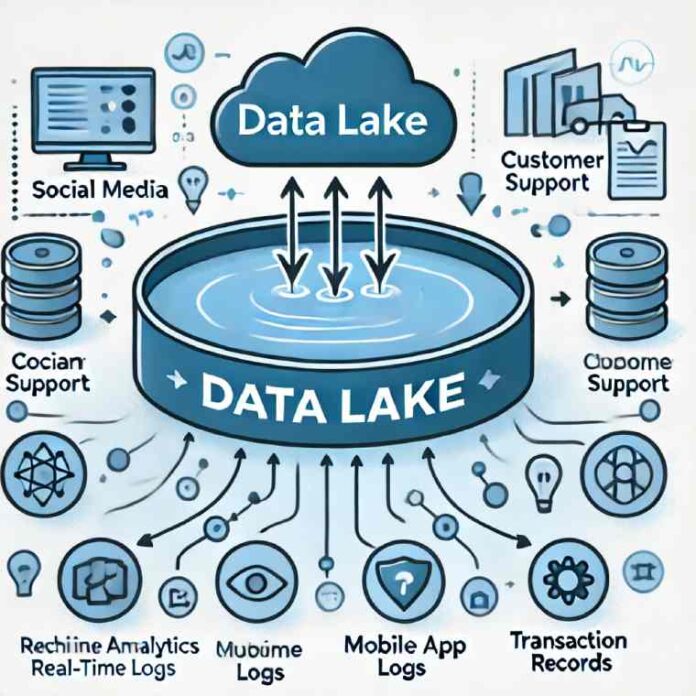In today’s data-driven world, companies collect massive amounts of data daily. However, traditional databases are often too rigid and structured to manage the diversity and scale of modern data effectively. That’s where data lakes come into play. This article dives into what a data lake is, why companies like Wise might benefit from using one, and common problems with practical solutions that businesses can implement.
What is a Data Lake?
A data lake is a centralized storage system that can hold vast amounts of raw data in various formats. Unlike traditional databases, which require structured, organized data, a data lake accepts both structured and unstructured data, such as:
- Text files
- Social media feeds
- Images
- Videos
- Emails
- Sensor data
Since data lakes can store all this data in its original format, they provide a flexible foundation for storing diverse datasets, which can be analyzed later for valuable insights. Data lakes often leverage cloud technology, allowing for nearly unlimited storage capacity and scaling as a business grows.
How Data Lakes Differ from Data Warehouses
To understand data lakes better, it helps to compare them with data warehouses. Data warehouses are typically structured, organized systems designed for specific types of structured data (e.g., tables and spreadsheets). They are ideal for running complex business intelligence (BI) reports on historical data but struggle with unstructured formats like videos or social media posts.
A data lake, on the other hand, offers a “one-size-fits-all” approach where companies can dump raw data without a predefined structure. This gives data scientists the freedom to experiment and analyze new types of data as they come in, which is beneficial for companies that prioritize innovative analytics.
Why Companies Like Wise Should Consider Data Lakes
Wise, like other companies in the financial sector, handles a vast amount of data from various sources – from transaction records to customer support inquiries. Here’s why data lakes can be valuable to companies like Wise:
- Scalability and Flexibility: As Wise continues to grow globally, the amount of data it generates expands exponentially. A data lake can easily scale with this growth, storing data as it comes without needing constant restructuring.
- Unified Data Storage: With multiple types of data (e.g., financial transactions, chat logs, app performance data), Wise can store all this information in one place, simplifying data management and making it easier for data scientists to run analyses across various datasets.
- Enhanced Customer Insights: Analyzing data from customer interactions, transaction histories, and app usage patterns can give Wise deep insights into customer needs and behavior, leading to better decision-making.
- Support for Machine Learning: Many companies leverage machine learning (ML) to improve customer experience. Wise could use data lakes as a foundation to build ML models that detect fraud, recommend services, and enhance the user experience based on behavioral patterns.
Problem: Managing Unstructured Data in Financial Services
A common challenge for companies like Wise is handling and processing unstructured data efficiently. Unstructured data from sources like social media, customer support, and mobile app logs can be challenging to analyze without a data lake. This type of data is essential for a complete view of the customer journey but can overwhelm traditional databases, especially in real-time applications.
Solution: Data Lakes for Real-Time Processing and Analysis
Data lakes address this problem by providing a centralized, cost-effective repository for all types of data. For example, if Wise wants to analyze customer feedback from social media, a data lake can store and organize that data alongside structured transaction data. This combined view can be used to create a customer satisfaction score or identify recurring pain points.
Key Benefits of Data Lakes for Companies
- Real-Time Analytics: Data lakes support real-time data processing, enabling Wise to monitor transactions, detect fraud, and manage risks instantly.
- Cost-Effective Data Storage: Storing all data in a single data lake can be more cost-effective than maintaining separate databases, especially when it comes to scaling.
- Advanced Security and Compliance: With data lakes, companies can implement secure storage and access management to keep data safe and meet regulatory standards, crucial for financial institutions like Wise.
How to Utilize Data Lakes Effectively
For companies considering a data lake, here are a few strategies to ensure maximum benefits:
- Establish Data Governance Policies: Create guidelines for how data will be stored, accessed, and used within the data lake to maintain security and compliance.
- Integrate with Data Analytics Tools: Connect the data lake with analytics and visualization tools to make it easier for data analysts to pull insights.
- Implement Automated Data Processing Pipelines: Companies can set up ETL (extract, transform, load) pipelines to prepare data for analysis in real time, improving efficiency and data quality.
- Invest in Machine Learning: Data lakes provide a foundation for training machine learning models, which can generate insights and help predict trends.
Conclusion
Data lakes offer companies like Wise a flexible, scalable, and efficient way to store and analyze diverse data types. By unifying data across customer interactions, financial transactions, and system logs, Wise can gain a 360-degree view of its operations and customer needs. With real-time data processing capabilities, advanced security features, and cost-effective storage, data lakes empower companies to make data-driven decisions and respond quickly to market changes.
As companies grow and data needs evolve, data lakes will continue to be a valuable asset in managing, analyzing, and leveraging data for better decision-making and customer satisfaction.




